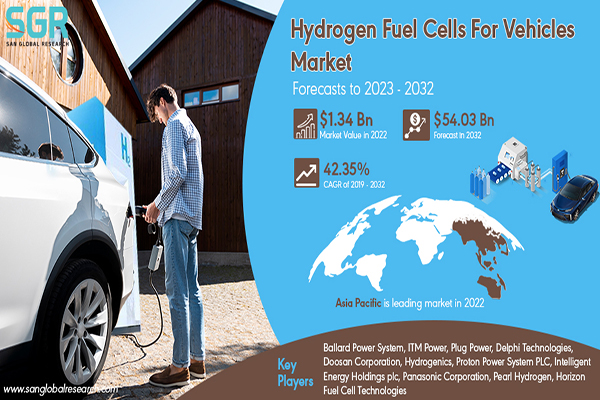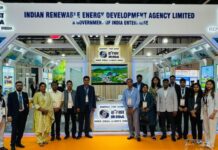According to the new report titled “Hydrogen Fuel Cells For Vehicles Market by Vehicle Type (Passenger Cars, LCVs, HCVs), By Technology (Proton Exchange Membrane Fuel Cell, Phosphoric Acid Fuel Cell) and Range (0-250 Miles, 251-500 Miles, Above 500 Miles) – Global Analysis to 2022″, the valuation of the Hydrogen Fuel Cells For Vehicles Market was $1.34 Billion in 2022 and is projected to reach $54.03 Billion by 2032, at a CAGR of 42.35% from 2019 to 2032.
The Hydrogen Fuel Cells For Vehicles Market was valued at $1.34 Billion by 2022 and expected to grow at CAGR of 42.35% over forecast period. Hydrogen fuel cells for vehicles are a type of alternative powertrain technology used to propel vehicles, typically automobiles or buses. These fuel cells generate electricity through a chemical reaction between hydrogen and oxygen, producing water vapor and heat as byproducts. The basic working principle involves converting the chemical energy stored in hydrogen into electrical energy, which then powers an electric motor to drive the vehicle.
Advancements in Technology and Global Transition to Green Energy dominated the Hydrogen Fuel Cells For Vehicles Market
Ongoing advancements in fuel cell technology, materials science, and manufacturing processes are contributing to the improvement of the efficiency and cost-effectiveness of hydrogen fuel cells. As technology progresses, it becomes more feasible and economically viable for various applications. The global push for cleaner and greener energy sources is driving interest in hydrogen fuel cells as part of a diversified and sustainable energy mix. As nations strive to reduce dependence on fossil fuels, hydrogen is seen as a valuable option for decarbonizing multiple sectors.
Passenger Cars held the largest share in the Hydrogen Fuel Cells For Vehicles Market
Based on Vechile Type, the Hydrogen Fuel Cells For Vehicles Market is segmented into Passenger Cars, LCVs, HCVs. The demand for passenger cars equipped with hydrogen fuel cells was gradually increasing, albeit from a relatively small base. Automakers were investing in research and development to bring hydrogen fuel cell vehicles (FCVs) to the market, and some had already introduced or planned to introduce such vehicles. Companies like Toyota, Hyundai, and Honda have been at the forefront of developing and commercializing hydrogen fuel cell passenger cars. The Toyota Mirai, Hyundai Nexo, and Honda Clarity Fuel Cell are examples of hydrogen fuel cell cars that were available in certain markets.
Asia Pacific headed the Hydrogen Fuel Cells For Vehicles Market in 2022
Asia Pacific region was showing signs of growth, several countries in the region were actively pursuing hydrogen as a clean energy solution and were making investments in infrastructure and technology to support the development of a hydrogen economy. Japan has been a pioneer in the development and adoption of hydrogen fuel cell technology. Japanese automakers, including Toyota and Honda, have been actively involved in the production and commercialization of hydrogen fuel cell vehicles. The Japanese government has also been supportive, providing incentives and investing in infrastructure for hydrogen refueling stations. South Korea has shown interest in hydrogen as part of its clean energy strategy. Hyundai, a South Korean automaker, has been a key player in the development of hydrogen fuel cell vehicles. The government has also announced plans to invest in the hydrogen infrastructure, including the construction of hydrogen refueling stations.
Key market players operating in the market that are profiled in the report are Ballard Power System, ITM Power, Plug Power, Delphi Technologies, Doosan Corporation, Hydrogenics, Proton Power System PLC, Intelligent Energy Holdings plc, Panasonic Corporation, Pearl Hydrogen, Horizon Fuel Cell Technologies, etc.















